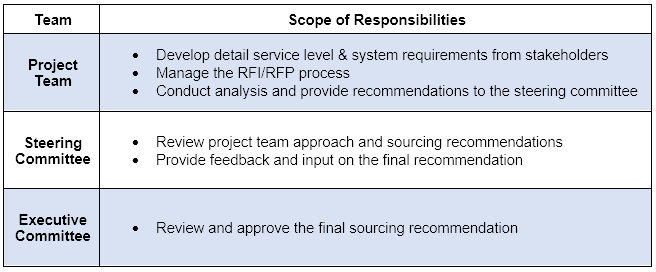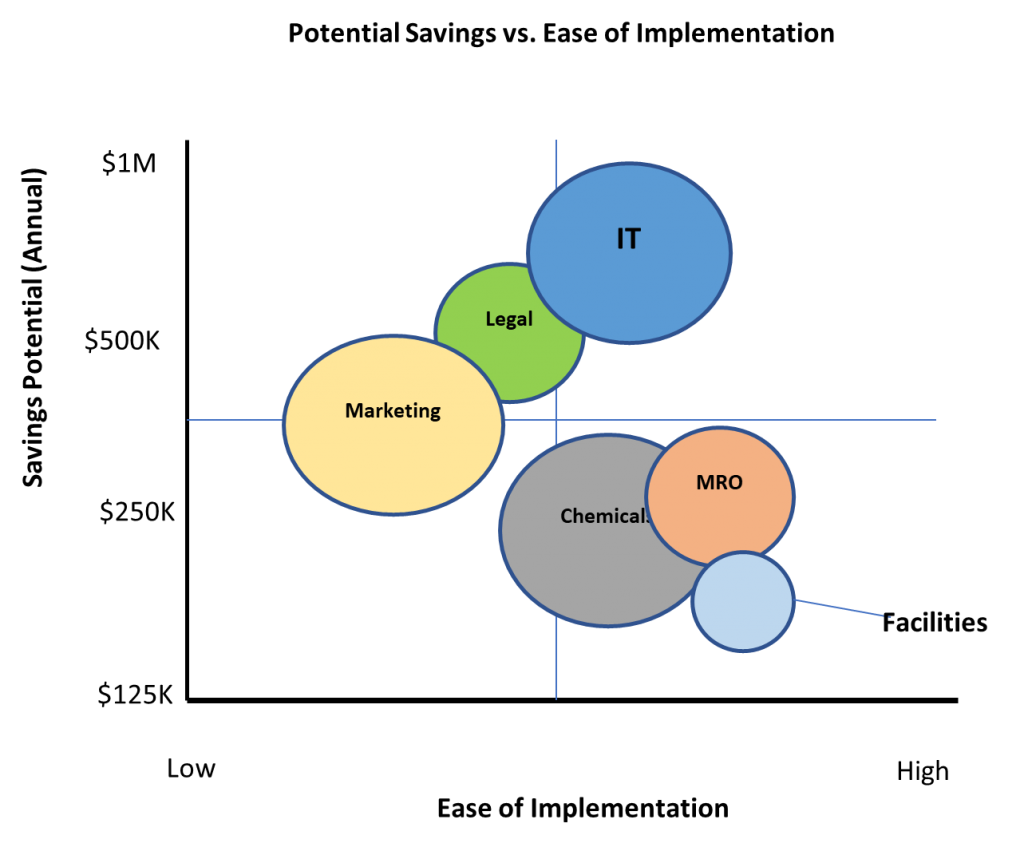Marketing Spend Sourcing – Key Learnings From The Field
By David Brown, Vice President, Client Services, OnDemand Resources, LLC
We are seeing Marketing spend becoming a key focus area for companies to generate substantial savings. Yet, organizations often put more analytical rigor and require more business justification for a $1,000 laptop purchase than they do for multi-million-dollar advertising investments. Marketing IS one of the last green sourcing pastures in corporate America and one that is particularly ripe to harvest in the current business environment.
To lead the sourcing effort, the client brought in Dave Stowe, a member of the OnDemand Professional Network with deep pharmaceutical industry sourcing expertise to work with the VP of Patient Safety, scientists and the IT organization.

APPROACH
The client created a core team with representatives from PV, IT and procurement to manage the details of the sourcing process and established a steering committee to provide executive oversight prior to making the final recommendation.
The core team developed a three phased approach starting with a Request-for-information (RFI), continuing with a Request-for-Proposal (RFP) and concluding with a recommended vendor and technology platform for executive approval. This approach provided them with an opportunity to thoroughly understand the supply market, services, technology platforms and cost structure.
For the RFI phase, the team engaged nine suppliers to solicit information on services and technology platforms on how to deploy business processes to meet requirements for:
- Case processing
- Aggregate safety data reporting
- Literature services
- Signal detection and management
- Data visualization and analytics
- Quality metrics and inspections
As a result of the knowledge gained through the RFI phase, the team was able to select a technology platform, develop an RFP and down select four suppliers to solicit formal proposals.
To evaluate the proposals, the team:
- Developed a comprehensive set of business and financial criteria
- Solicited input from stakeholders across the R&D, regulatory, quality, medical information, regulatory affairs, legal and clinical operations to meet with the supplier teams and evaluate their offerings.
CRITICAL SUCCESS FACTORS
- Facilitating working meetings with stakeholders to accurately capture requirements and issues across the following four areas:
- Incumbent performance
- Technology platform requirements
- Service provider requirements
- Transition requirements
- Creating a collaborative RFI/RFP process with suppliers to uncover options which would serve the client team vs. standard offerings
Establishing and defining the roles for the following 3 different stakeholders:

As a result of this collaborative approach, the team was able to develop a solution acceptable to the users, finance, legal and the executive committee.
RESULTS
The engagement generated a 36% reduction (savings) in run rate costs for both the services and technology platform. Accounting for one-time transition costs to the new supplier and technology platform, the project generated 19% in overall cost savings.
Solution provided the PV team with a leading best in class technology platform and provided out of the box ability to integrate with company’s clinical trial system. Platform provided extensive analytic and reporting capabilities and continuous updates compliant with worldwide regulatory standards for PV case management.
Finally, the sourcing analysis was “executive ready” to secure agreement from the CEO and executive committed to finalize the contract with a new supplier.
I have spent a large part of my career focused on enhancing value and capturing savings in the area of Marketing Spend. Here are TEN KEY LEARNINGS that might benefit anyone getting ready to make a run at this elusive space. Additionally, you can review our case study on Marketing Spend Sourcing with a F500 B2B Services company here:
- Procurement fundamentals are no different for Marketing purchases.
- Savings are captured from de-fragmentation.
- Savings are captured as suppliers compete for your business.
- Audits often find recoverable spend.
- Professional service costs are a function of labor: the number of resources, the seniority mix, and the market cost for their expertise.
- Get “C” level executive support and air cover before you dive in.
- Ideal support comes from the CMO, but the CFO or CEO can make it work, too.
- If the CMO and his/her lieutenants do not want you there initially, make sure the CFO is willing to stick out his/her neck to keep you there until you can build trust, otherwise, hunt elsewhere.
- The big efficiencies are where the big dollars are: media.
- Most companies focus on creative agencies, however the largest spend is working media, both traditional and increasingly digital.
- Saving ranges in media sourcing are 10 to 30%+; do the math on what that equates to at your company.
- Media procurement is technical, so you will need an expert to go head to head with the incumbent media buyers and agencies.
- If you are new to Marketing sourcing, train under an expert, then go it alone.
- Any good, analytical sourcing professional can source advertising once they learn the terminology, the techniques, and the space.
- Come up the learning curve by reading Ad Age, taking ANA (Association of National Advertisers) courses and reading their publications.
- Once you’ve trained under an expert for one cycle, you can perform subsequent iterations alone.
- Expect the popular defenses (usually in this sequence).
- Nothing to find here defense: “We’ve already cut to the bone.”
- The money defense: “We’ll lose revenue if we do this.”
- The competitive defense: “We’re already outspent by our competition. This will make things worse.”
- The brand defense: “If we do this, it will harm the brand.”
- The “we’re different” defense: “Buying Marketing is different than buying paper clips.” (see #1)
- The question the data defense: “The conclusions are accurate, but I don’t know where they got their data.”
- The “shoot the messenger” defense: “They only care about cost.”
- With data and executive support, all objections will ultimately be overcome, and efficiencies will be delivered.
- It should be noted that many Marketing professionals are not defensive, are open minded and willing to innovate. (see #6)
- Market your sourcing wins under the “innovation” banner.
- Innovation is rewarded by corporations whereas overspending by millions is not.
- Done correctly, Marketing sourcing is a win-win.
- Consider starting with an agency audit or sourcing commercial print to build momentum.
- Auditors are less threatening, and nobody is against recovering owed money.
- Proactively performing an audit demonstrates fiduciary responsibility for Marketing executives.
- Recovering money via an audit is a “base hit” one can build momentum on to move up the value chain.
- The best way to succeed is by building relationships of trust and credibility.
- Consultants can break glass, deliver results in a few months, then walk away whereas corporate professionals must take a longer term (1 – 2 years), patient perspective.
- Building trust and rapport will make Marketing colleagues start to view the glass as “half full.”
- Bring something beyond academic sourcing to the table.
- Bring an idea that you learned from a functional industry peer or at a conference.
- Perform analysis which uncovers an insight that suggests a course of action.
- Smart Marketing personnel can replicate academic purchasing theory and practice (e.g. 3 bids and a cloud of dust), so you need to bring more.
- Marketing is still part science and part art. Don’t kill the creative process.
- The companies with the strongest brands have market capitalizations 3x vs. their peers, so done right, it is a tremendous investment vs. a cost to minimize.
- There are rarely definitive rights and wrongs, just cost-benefit trade-off decisions.

ABOUT THE AUTHOR
David is a former management consultant and procurement executive with extensive experience in strategic sourcing and outsourcing focusing on indirect categories, with particular expertise in Marketing and Real Estate categories. Prior to joining OnDemand Resources in May 2020, his career included a VP Strategic Sourcing role with Ameriprise Financial, VP Global Sourcing at Deutsche Bank, Manager Sourcing & Category Management at ICG Commerce (now Accenture), founding member of Zeborg and a consultant with Mitchell Madison Group. Additionally, David completed over 20 engagements as an independent consultant in US and Europe across multiple industries including financial services, consumer products, gaming, government, hotels, HVAC service, manufacturing, non-profit, retail products and transportation.
David is happy to share his Marketing Sourcing knowledge and discuss how OnDemand can help deliver significant value in the area of Marketing Spend. He can be reached at dbrown@ondemandresources.com









